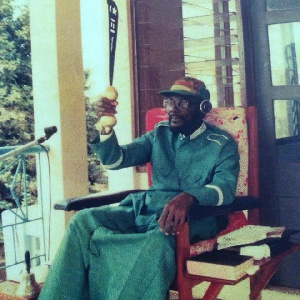Long before his ministry, the Apostles Revelation Society (ARS), became a household name in Ghana, its founder and spiritual leader, Prophet Charles Kwabla Nutornuti Wovenu, was a man who was revered by the country’s first president, Osagyefo Dr. Kwame Nkrumah.
It was such a relationship that courted the vilification of other men of faith, simply because they did not understand why the president had such an affinity for him.
And it was just that, as accounts on the official website of the ARS church, apostlesrevelationsociety.com, would indicate, things got, even more, vilifying for CKN Wovenu after Kwame Nkrumah invited him as the official spiritual leader to consecrate the official seat of government, the Christiansborg Castle (Osu Castle), on May 22nd 1966.
But that move did not please other pastors, including the Christian Council of Ghana, who described Wovenu as a ‘village pastor.’
And indeed, he may have been a ‘village pastor’ as he started his ministry work in Tadzewu, a town in the Volta Region of Ghana, which at the time was not so popular.
“Ghanaians and the whole world woke up, the morning of May 22nd 1966, to the news that Christiansborg Castle, the seat of the Government of Ghana was consecrated by Charles Kwabla Nutornuti Wovenu, the founder and Spiritual leader of the Apostles Revelation Society (A.R.S.) The range of feelings was profound. It ranged from joy and vindication to utter anger and hatred.
“The Christian Council of Ghana served the most vitriolic criticism, not only of the events but also of the Government ignoring it and bringing a ‘village pastor’ to perform such an important national duty. To his supporters this was indeed a validation of the man, and his steadfast traditional African approach to Christian worship,” the narration on the ARS website said.
But CKN Wovenu was not just another ordinary person in the life of Nkrumah, and some of the following events may explain why.
Further details on the ARS website say that the ability of their founder to foretell future events, including a most significant one that would see the end of Nkrumah’s reign, may have contributed to why the president kept him so close.
The narration added, Wovenu knew exactly when Kwame Nkrumah’s rule would end, and he did share this with the Head of State.
This, it added, led to another close relationship between General Ankrah and CKN Wovenu, as a result of a prophecy the latter gave to the former.
“Few knew that Wovenu had foretold the cataclysmic events of 24th February 1966; the day the powerful government of Kwame Nkrumah was overthrown.
“This is how the story went. General Ankrah, one of the most trusted of Dr. Kwame Nkrumah‘s men was fired from office for no reason. He was devastated and sought spiritual counselling. He came to Tadzewu and consulted with Wovenu.
“After a serious prayer session, he was informed that he was going to be the next Head of State of Ghana. His expulsion from the Ghana Army was the work of providence, designed to insulate him from what was going to happen in Ghana. Ankrah was dumfounded,” it said.
The narration also indicated that although General Ankrah believed in the ideals of Nkrumah, he equally took the prophecy from Wovenu seriously and worked around it.
It continued that all the while, Wovenu had also told Kwame Nkrumah what to expect, as well as what he needed to do to avert it.
“At the height of Kwame Nkrumah’s rule, Ghanaians had come to accept the fact that ‘Kwame Nkrumah never dies – He forever lives.’ Ankrah was no exception, but he believed Wovenu and went through further prayer sessions to be prepared for what was to happen. We do not know if he was told in plain terms what was to happen. We do know that Wovenu knew that on 24th of February 1966 Kwame Nkrumah’s rule of Ghana was going to cease.
“He had prophesied to Kwame Nkrumah when he was incarcerated at the Ussher Fort Prisons in 1951. He was also advised about what to do to avoid the events of February 1966 at that encounter at Ussher Fort. When he came to power, he lost sight of his God, sought protection from other things, and did not heed the advice he had been given.
“The coup of February occurred as prophesied and catapulted Ankrah from unemployment to head of state. Unlike Kwame Nkrumah, he remembered his roots and kept in touch with Wovenu,” it added.
The narration added that, as part of the national assignments that General Ankrah handed over to CKN Wovenu, was the consecration of the Osu Castle, but that led to the end of any such opportunities for him.
“The consecration of the castle was, therefore, one of the spiritual rituals that Wovenu had performed at his bidding. There was so much uproar that Wovenu did not perform any other public ritual at the national scene. It is important to know that most heads of state of Ghana knew him and consulted him liberally for advice and spiritual protection,” it added.
Read more about CKN Wovenu in the post below:
Source: www.ghanaweb.com
 Home Of Ghana News Ghana News, Entertainment And More
Home Of Ghana News Ghana News, Entertainment And More




